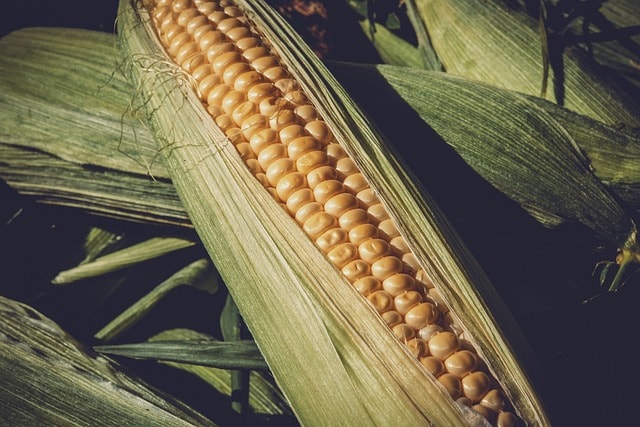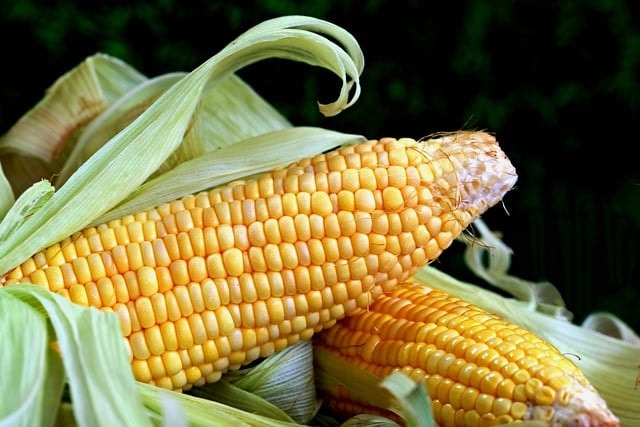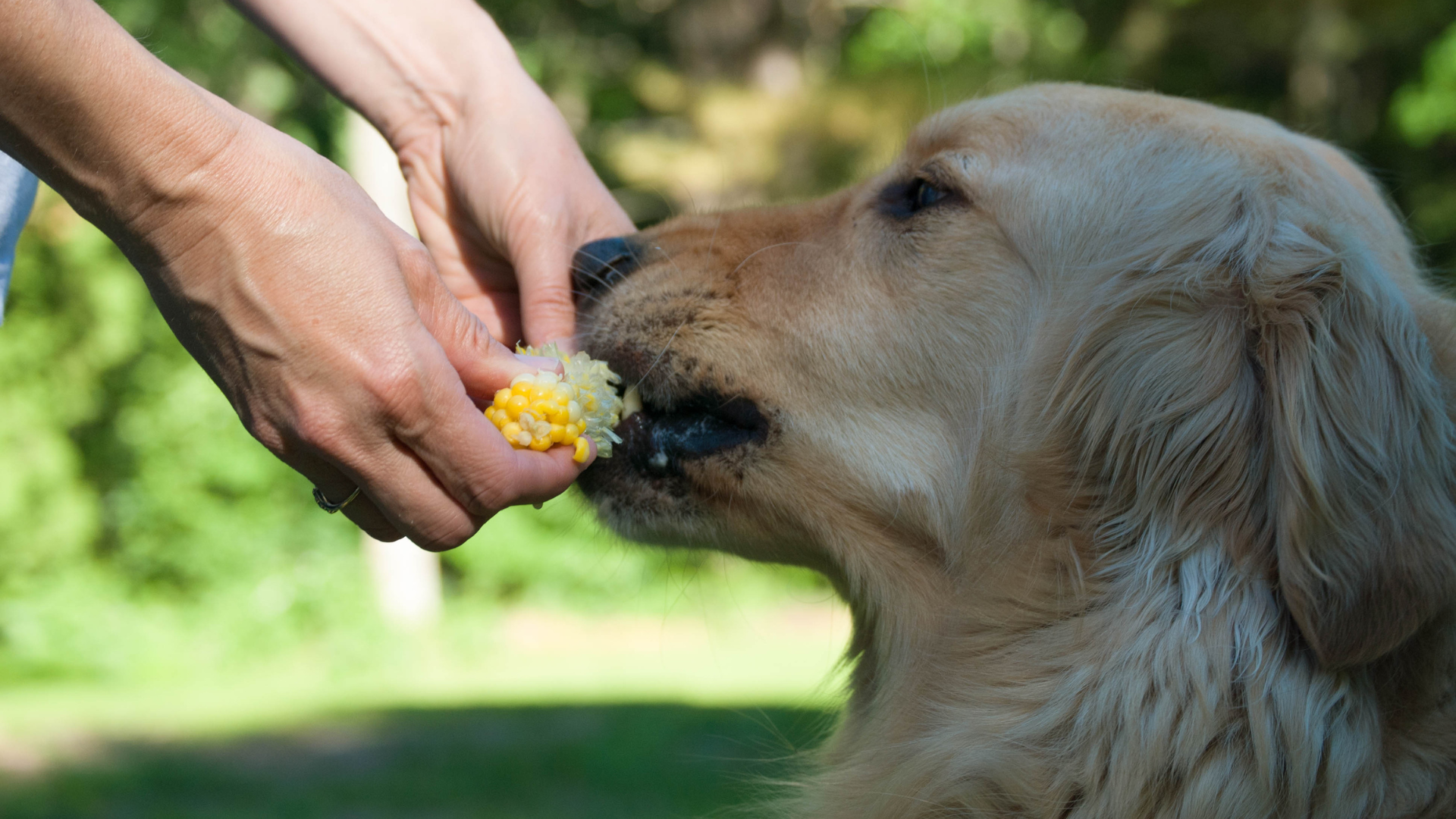Can Dogs Eat Corn? Everything You Need to Know
Many dog owners ask themselves the question: Can dogs eat corn? In fact, corn is often a common ingredient in commercial dog food. But what about the unprocessed form? Is the vegetable safe for dogs and what are the benefits or risks associated with it?
In this comprehensive guide, we clarify whether dogs can eat corn and what aspects need to be considered so that you can make an informed decision.

Can my dog eat corn?
The answer is yes, dogs can eat corn in moderate amounts. Corn is not toxic to dogs and may even provide some health benefits. It is a good source of carbohydrates, fiber, vitamins (such as B vitamins) and minerals (magnesium, potassium). These nutrients can provide your dog with energy, aid digestion and strengthen the immune system. However, corn should always be fed in the right form and not overly included in the diet.
What are the benefits of corn for dogs?
Dogs particularly benefit from the carbohydrates that corn provides. These are an important source of energy, especially for active dogs. Fiber also promotes healthy digestion, which can be beneficial for dogs prone to constipation. The B vitamins contained also support the dog's metabolism and nervous system. However, it is important to ensure a balanced diet in which corn is only a small component.
Canned corn or fresh corn: which is better for dogs?
Fresh corn is generally better than canned corn. This is because canned corn often contains sugar, salt or preservatives that are not good for dogs. If you decide to include corn in your dog's diet, it is recommended that you use fresh corn and cook it well. This will ensure that your dog can absorb the nutrients better and minimize the risk of digestive upset.
If you do use canned corn, make sure it does not contain any added salt or sugar. These additives can be harmful to dogs and lead to gastrointestinal problems.
Dangers of Gastrointestinal Obstruction from Corn Cobs
An important question that comes up again and again is: Can dogs eat corn on the cob? The answer is a clear no. They pose a serious danger to dogs. When dogs try to chew on the cob, they can easily swallow pieces of it. These pieces can cause gastrointestinal obstruction, which leads to life-threatening complications. An intestinal obstruction can only be repaired surgically and is associated with severe pain and significant risks for the dog. Therefore, corn on the cob should always be kept out of the dog's reach.
Signs of Gastrointestinal Obstruction in Dogs
Gastrointestinal obstruction (also called intestinal obstruction) poses a serious threat to a dog's health when it swallows indigestible foreign objects such as corn cobs. Dogs can break off and swallow large pieces while chewing, which then block the intestine. This condition is extremely dangerous because it impedes blood flow in the intestine and, in the worst case, can lead to tissue death. The typical symptoms of gastrointestinal obstruction are varied and should not be ignored under any circumstances.
Signs that indicate a blockage of the gastrointestinal tract include:
-
Severe vomiting , often associated with attempts to vomit but nothing coming up.
-
Increased salivation and difficulty swallowing.
-
Abdominal pain : Dogs often pull up their legs or become sensitive when their abdomen is touched.
-
Loss of appetite : The dog refuses food and shows general listlessness.
-
constipation or difficulty passing stools: Bloody stools or diarrhea may also occur.
If left untreated, a gastrointestinal blockage can become life-threatening within a few hours. Therefore, a veterinarian should be consulted immediately if you suspect that your dog has swallowed a corn cob or other indigestible object.
Corn in dog food: good or bad?
Many commercial dog foods contain corn as a main ingredient. This is often because it is a cheap and readily available source of carbohydrates. In moderate amounts, corn is safe in dog food. However, there is also criticism that it is often used as a cheap filler that can reduce the nutritional content of the food. Although corn provides energy and some vitamins, it cannot be a substitute for high-quality protein from meat, which is particularly important for dogs.
Nevertheless, corn in reasonable quantities is not a problem and can be part of a balanced diet. It is important to pay attention to the overall composition of the feed and make sure that it contains all the necessary nutrients.
How should corn be prepared for dogs?
If you decide to feed your dog corn, it is essential to prepare it properly. If it is raw, it is difficult for a dog to digest as their digestive systems are not designed to break down plant cell walls. Therefore, corn should always be cooked or pureed to increase digestibility. When cooked, it is soft and easily digestible, which allows the dog to optimally absorb the nutrients it contains.
It is also important to serve the corn without any spices, butter or salt. These additives, which people often use to flavor it, can cause digestive problems or even be toxic to dogs. Salt can disrupt a dog's electrolyte balance and spices such as garlic or onion powder are toxic to dogs. Even butter, which seems harmless at first glance, can cause digestive problems such as diarrhea in dogs, as many dogs do not tolerate lactose well.
To make it easier to absorb the nutrients, you can also puree the corn and offer it in small quantities as an addition to the normal meal. It can also be used as a treat or as an occasional addition to the dog's food, but it should never be the main component of the diet.

Can dogs eat corn if they have a grain allergy?
For dogs who suffer from a grain allergy, the question is whether corn is safe for them to eat, especially since it is often used as a carbohydrate source in grain-free dog foods. Corn is naturally gluten-free, which is why it is used in many dog foods that are suitable for dogs with gluten intolerance. However, there are times when a dog can still be sensitive to it even if it does not contain gluten.
A grain allergy in dogs often manifests itself through symptoms such as skin irritation, itching, gastrointestinal problems or diarrhea. If you suspect that your dog is allergic to grain or corn, it is advisable to feed it in small quantities at first and observe closely whether symptoms appear. In the event of an allergic reaction, it should be avoided completely.
Conclusion: Can dogs eat corn?
In summary, dogs can generally tolerate the consumption of corn kernels as long as they are prepared correctly and fed in appropriate quantities. Cooked corn kernels are a valuable addition to the diet as they are rich in carbohydrates as well as important nutrients such as fiber, vitamins and minerals. These ingredients promote digestion and provide additional energy, which can be particularly beneficial for an active dog.
However, caution is advised. A dog should only eat cooked corn in moderation and should never have access to corn on the cob, as this can lead to dangerous gastrointestinal blockages. These are indigestible and can cause serious complications that require emergency surgery.
Corn kernels should always be served without any additives such as salt, butter or spices, as these can be harmful. A dog with a grain intolerance or allergy in particular should only be fed corn with caution and under observation, as allergic reactions can also occur in rare cases. Therefore, observe your dog closely after consumption and consult a veterinarian if there are signs of intolerance or uncertainty.

